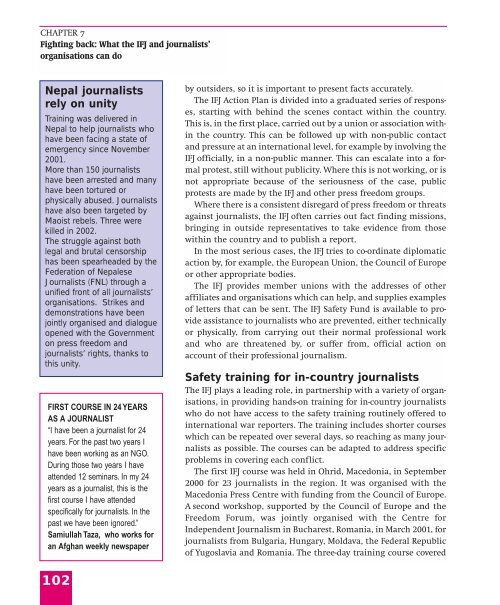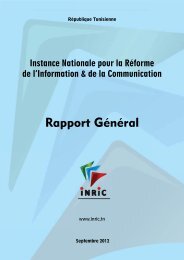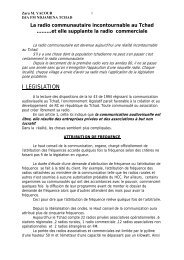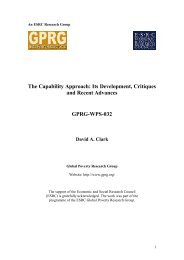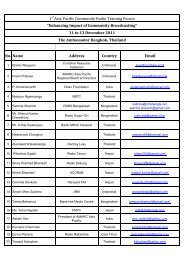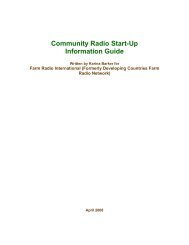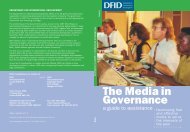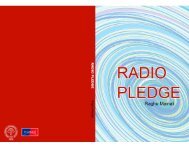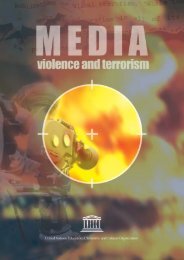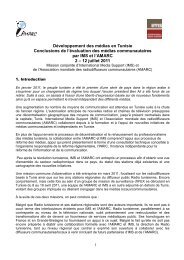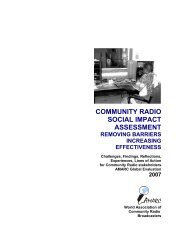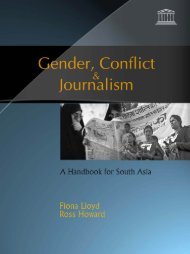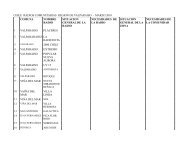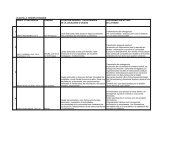Live News - A Survival Guide - International Federation of Journalists
Live News - A Survival Guide - International Federation of Journalists
Live News - A Survival Guide - International Federation of Journalists
- No tags were found...
You also want an ePaper? Increase the reach of your titles
YUMPU automatically turns print PDFs into web optimized ePapers that Google loves.
CHAPTER 7Fighting back: What the IFJ and journalists’organisations can doNepal journalistsrely on unityTraining was delivered inNepal to help journalists whohave been facing a state <strong>of</strong>emergency since November2001.More than 150 journalistshave been arrested and manyhave been tortured orphysically abused. <strong>Journalists</strong>have also been targeted byMaoist rebels. Three werekilled in 2002.The struggle against bothlegal and brutal censorshiphas been spearheaded by the<strong>Federation</strong> <strong>of</strong> Nepalese<strong>Journalists</strong> (FNL) through aunified front <strong>of</strong> all journalists’organisations. Strikes anddemonstrations have beenjointly organised and dialogueopened with the Governmenton press freedom andjournalists’ rights, thanks tothis unity.FIRST COURSE IN 24 YEARSAS A JOURNALIST“I have been a journalist for 24years. For the past two years Ihave been working as an NGO.During those two years I haveattended 12 seminars. In my 24years as a journalist, this is thefirst course I have attendedspecifically for journalists. In thepast we have been ignored.”Samiullah Taza, who works foran Afghan weekly newspaperby outsiders, so it is important to present facts accurately.The IFJ Action Plan is divided into a graduated series <strong>of</strong> responses,starting with behind the scenes contact within the country.This is, in the first place, carried out by a union or association withinthe country. This can be followed up with non-public contactand pressure at an international level, for example by involving theIFJ <strong>of</strong>ficially, in a non-public manner. This can escalate into a formalprotest, still without publicity. Where this is not working, or isnot appropriate because <strong>of</strong> the seriousness <strong>of</strong> the case, publicprotests are made by the IFJ and other press freedom groups.Where there is a consistent disregard <strong>of</strong> press freedom or threatsagainst journalists, the IFJ <strong>of</strong>ten carries out fact finding missions,bringing in outside representatives to take evidence from thosewithin the country and to publish a report.In the most serious cases, the IFJ tries to co-ordinate diplomaticaction by, for example, the European Union, the Council <strong>of</strong> Europeor other appropriate bodies.The IFJ provides member unions with the addresses <strong>of</strong> otheraffiliates and organisations which can help, and supplies examples<strong>of</strong> letters that can be sent. The IFJ Safety Fund is available to provideassistance to journalists who are prevented, either technicallyor physically, from carrying out their normal pr<strong>of</strong>essional workand who are threatened by, or suffer from, <strong>of</strong>ficial action onaccount <strong>of</strong> their pr<strong>of</strong>essional journalism.Safety training for in-country journalistsThe IFJ plays a leading role, in partnership with a variety <strong>of</strong> organisations,in providing hands-on training for in-country journalistswho do not have access to the safety training routinely <strong>of</strong>fered tointernational war reporters. The training includes shorter courseswhich can be repeated over several days, so reaching as many journalistsas possible. The courses can be adapted to address specificproblems in covering each conflict.The first IFJ course was held in Ohrid, Macedonia, in September2000 for 23 journalists in the region. It was organised with theMacedonia Press Centre with funding from the Council <strong>of</strong> Europe.A second workshop, supported by the Council <strong>of</strong> Europe and theFreedom Forum, was jointly organised with the Centre forIndependent Journalism in Bucharest, Romania, in March 2001, forjournalists from Bulgaria, Hungary, Moldava, the Federal Republic<strong>of</strong> Yugoslavia and Romania. The three-day training course covered102


